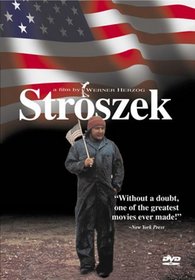| Actors: Bruno S., Eva Mattes, Clemens Scheitz, Wilhelm von Homburg, Burkhard Driest Director: Werner Herzog Creators: Thomas Mauch, Werner Herzog, Beate Mainka-Jellinghaus, Willi Segler Genres: Indie & Art House, Drama Sub-Genres: Indie & Art House, Drama Studio: Starz / Anchor Bay Format: DVD - Color,Widescreen,Anamorphic DVD Release Date: 01/08/2002 Original Release Date: 01/12/1977 Theatrical Release Date: 01/12/1977 Release Year: 2002 Run Time: 1hr 55min Screens: Color,Widescreen,Anamorphic Number of Discs: 1 SwapaDVD Credits: 1 Total Copies: 0 Members Wishing: 7 MPAA Rating: Unrated Languages: English Subtitles: English |
Search - Stroszek on DVD
  | Stroszek Actors: Bruno S., Eva Mattes, Clemens Scheitz, Wilhelm von Homburg, Burkhard Driest Director: Werner Herzog Genres: Indie & Art House, Drama UR 2002 1hr 55min Bruno Stroszek is released from prison and ekes out a living as a street musician. He befriends Eva, a prostitute down on her luck. After they are harried and beaten by Eva's pimps, they join Bruno's neighbor, Scheitz, an ... more » |
Larger Image |
Movie DetailsSimilar Movies
Similarly Requested DVDs
|
Movie ReviewsThrilling to read these great reviews Eileen Corder | 07/12/1999 (5 out of 5 stars) "It really is exciting to read these great reviews about "Stroszek." About twenty years ago, I met Herzog and was given the opportunity to play the young banker who reposesses the mobile home in this film. It was a wonderful experience...and something I look back on with great joy. I know I am biased, but this truly is a great film." A Rare Gem Douglas E. Pritchard | Albany, NY | 11/17/2001 (5 out of 5 stars) "I find it frustrating that American filmmakers cannot make a film as good as this one is. The whole story of misplaced hopes and lost dreams on the dreary American landscape is more powerful in it's telling than many films have been. The action of this film moves us from birth to death in a philosophical journey of the soul. The arrival of these obviously hopeful and distraught people on American shores is like the rebirth many immigrants went through when they escaped their own countries and arrived here. Dreams of streets paved with gold and the easy credit of American commerce is the undoing of many yet, here we see the disaster of it all. One doesn't have to be a recent immigrant to experience the foibles of modern credit like our characters do. They exemplify it though and it is to their peril that they do not understand it. The closing scene where we hear the solitary gunshot is most powerful. That it is done near a roadside zoo with it's caged animals is perfect because it portrays the cage our man has put himself into. There is only one way out, he takes it. Like many powerful financiers of the twenties who lost everything he does the only thing which will solve his problems. The gunshot is his goodbye to his problems and the beginning of his new life. A shame that American studios cannot produce movies such as this. They are in need of lessons from directors who understand cinema and should study films of this type. Maybe they will be able to improve the fare they offer to us." Herzog's Humanity Eileen Corder | West Coast | 09/10/2005 (5 out of 5 stars) "Stoszek is a extraordinary patchwork of reality and fiction, German and English, introspection and extroversion. It's many unique images do not go away: a bottle of water that captures a live Breugel-like snow scene, rifle-toting farmers on tractors defending their strip of land, a wizened little man testing fence posts with a voltmeter, and the truly haunting "Dancing Chicken". Herzog, with the eye and ear of a poet, captures these and more, including the unforgettable and weighty performances by the many amateur actors. Most welcomed of this DVD is the commentary track by Herzog. It's like watching a second film. To see the same images while hearing his stories deepens the impact of Stroszek. We learn the fascinating backgrounds of the curious individuals involved: the dangerous Hamburg Prince, the compassionate doctor in the Preemie Ward, Al the trucker-pimp, Clayton the beer-swilling mechanic, the unnamed "extras" in the fields and truck stops of Wisconsin, and, of course, Bruno S. himself. " Probably Herzog's Best J. Pinkerton Snoopington | Toronto, Ontario, Canada | 01/27/2005 (5 out of 5 stars) ""Stroszek" is probably German director Werner Herzog's best film. It's a strange, unpredictable, and oddly funny movie. It's about a Berlin ex-con, Bruno Stroszek (played by a real-life disturbed street musician, Bruno S.), his prostitute girlfriend Eva, and his borderline-senile landlord Scheitz. After being repeatedly terrorized by Eva's pimps, they move to Wisconsin to live with some of Scheitz's friends and, hopefully, encounter the American dream. Revealing any more of the plot would be a crime. "Stroszek" not only has a terrific, haunting performance by Bruno S., but it contains the most fascinating depiction of America I have ever seen in a movie, as well as one of filmdom's funniest bank robberies.
The DVD has "Stroszek" in an aspect ratio of about 1.85:1. It's a bit grainy towards the beginning, but overall it looks pretty good, especially in the Wisconsin scenes. Of the extras, the most interesting is Herzog's commentary, basically an extended interview with a film historian named Norman Hill. It's a very fascinating blend of production tidbits, information about Bruno S., and some of Herzog's trademark tall tales. Also included are production notes (with are actually devoted more to film analysis and Herzog's relationship with Bruno S. than they are to production), a worthwhile Herzog biography, and a German trailer." |














